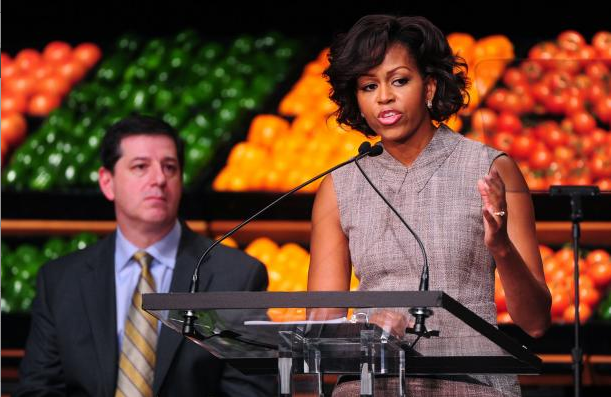 In a move that — if one pays attention to The Obama Administration’s economic polices — shouldn’t surprise anyone. First Lady Michelle Obama announced yesterday that she will be supporting an initiative that will allow the largest retailer in the world — along with other national chains — to bring their services to “food deserts.”
In a move that — if one pays attention to The Obama Administration’s economic polices — shouldn’t surprise anyone. First Lady Michelle Obama announced yesterday that she will be supporting an initiative that will allow the largest retailer in the world — along with other national chains — to bring their services to “food deserts.”
This declaration comes on the heels of a groundbreaking study, which suggested supermarkets do not help low income families battle obesity and other food-related illnesses effectively. By bringing in retail heavyweights like Wal-Mart and SuperVal-U, they are essentially creating larger fast-food depots.
Fast-food joints aren’t inherently bad; they offer government subsidized food at cheap prices to satisfy consumer demand and the profit margins for their stockholders, who expect short-term returns on their investment–basically, normal capitalistic behavior. The problem is that Wal-Mart stocks their shelves with same subsidized corn, soy, wheat, and factory-farmed meat which McDonalds serves.
The “food desert” issue is not solely about the lack of retailers, but it’s the lack of quality, local retailers. Large retailers do not offer enough affordable produce for consumers to have a fair choice.
“These changes will serve about 9.5 million people and could create tens of thousands of jobs,” says Melody Barnes, director of the Domestic Policy Council. Yes, these “job creators” will help the sagging economy but at what price?
Many policy makers want continue to blame citizens for their poor choices, but what they fail to take into account is that with worker’s wages stagnated, it creates limited choices by default. Not many people are realistically going to choose a $4 head of broccoli over the feeling of fullness that a fast-food value meal can gives them.
In a recent story published by Huffington Post, Janell Ross poignantly detailed the plight of many minorities and low-income, highly-educated workers, in regards to their lack of choice when it comes to their family’s diet:
Like millions of Americans who have suffered declines in their living standards as the jobless rate has climbed, Washington has found herself eating less-nutritious fare for the simple reason that quality food tends to cost more and take more time to prepare. Three or four nights a week, she and her son now complete a day spent shuttling between her part-time job, his school and her sister’s cramped apartment — their long-term “temporary” home — with dinner at a fast-food restaurant that caters to their craving for immediate calories at rock-bottom prices. She has put on more pounds than she is willing to discuss.
These stories are all too familiar today. No one is naming the problem–corporate and government policy melding into one entity–because of our adulation of President Obama. Yes, he is great man, but we have to hold him responsible for his economic policies. We are letting multi-national corporations feed us exclusively. The investment in small farms and local produce is being destroyed in favor of large Agri-Business partnerships.
While the First lady’s promised at her press conference to bring more fresh produce to these “food deserts,” she did not explain how this would happen.
According to USAToday, Wal-Mart will open 275 to 300 stores in food deserts between now and 2016, and already has opened 218 stores in such neighborhoods since 2007, says Leslie Dach, executive vice president of corporate affairs. “The Walmart customer deserves to have access to healthy food at prices they can afford,” Dach says.
The expansion is part of a comprehensive push by the retailer based in Bentonville, Ark., to promote healthier eating that also includes lower prices for premium products, such as whole wheat pasta, and support for charities.
With the recent rise in fuel prices, only the largest food retailers will survive if nothing is done–on a large scale–by the Obama Administration to restructure our food industry and economy at large. This is what will drive a new, green economy. If Wal-Mart and large retailers were interested in changing, they would have been part of the solution a long time ago.
This move, essentially, amounts to corporate welfare–similar to what the concessions the President made to the health care industry. Instead of standing firm to his purported progressive agenda, he succumbed to corporate bullying and lobbying.
President Obama gave health insurers three million more customers without addressing some of real problems in the health care industry. Obama was silent on many issues like high premiums, the increasingly high cost of medical school–which undoubtedly and understandably puts strain on new doctors that cause them to think about their pockets more than selfless care–and food-related illnesses and dis-eases that are placing an unprecedented and unnecessary strain on medical resources.
We have to push The Obama Administration to stay attuned to the people and not to corporate interests. It looks and sounds good to put the beautiful FLOTUS out in front of an obesity epidemic that needs compassion and reason from our leaders, but this plan will eventually bring out the ugliness that comes from people being dependent exclusively on large corporations for essentials of life.







I completely agree. I would rather put more emphasis on the expansion of local farmer’s markets. I don’t know much about food policy but if the produce and other food found at farmers markets were more affordable, then they would be more sustainable. The benefits would be two fold. You empower local farmers while also providing communities with fresher, healthier goods.
The administration recognizes the three main issues that cause diet-related illnesses: the prevalence of processed foods in people’s diets, fast food and too much meat. I discussed this in my post about soul food:
http://sisterescape.blogspot.com/2011/07/in-defense-of-soul-food.html
I love the FLOTUS but I have to agree with Le Chele. It going to be a sad day when we have no access to local produce. I don’t understand her position on this but I’m sure she knows what she is doing. She planted a garden on the White House lawn so hopefully she will start that movement soon.
ITA!!!!!
“The problem is that Wal-Mart stocks their shelves with same subsidized corn, soy, wheat, and factory-farmed meat which McDonalds serves.”
Child, please! Unless you actively choose higher priced certified free-range, non-irradiated, cruelty free products from the organic section of Cub, Rainbow, Food Lion, Safeway, or Kroger — you are getting factory farmed meat and veggies. This initiative is allowing folks to have access to meat and vegetables in places where there is virtually NO ACCESS unless you are taking a two-transfer bus or calling a cab.
The only access to groceries might be a sketchy cornershop “deli” with questionable, overpriced goods near to their expiration date. And they charge over four dollars for a jug a milk, but you buy it because you need to feed your children.
These are the places that Obama is encouraging Walmart to open up shop in. And, guess what…like SuperTarget and Safeway, they have organic products.
Here’s what’s funny: I’m from Arkansas and for my mental health I am loathe to step foot in a Walmart store. Even my once a decade sojourn gives me the willies. But of all the reasons to hate on that corporation, THIS is not one of them. I’m a former vegan, current locavore and all around foodie, but I’ll be damned if I use corporate farming as the reason to slam this initiative.
You could go to Walmart right now and get some beans and good ol’ Riceland rice. My daddy makes that in Stuttgart, Arkansas, so I know it’s good.
Organics are a problem mainly because the produce that Walmart sells is primarily GMO. If we went and funded small farm projects every place that a WalMart will be set up, then we would be employing people and restarting a new movement of green actions.
WalMart is the problem because of their practices of buying cheap goods from overseas and US prisons at severely depressed wages in order to match the demand for excess of materials that Americans are constantly programmed to buy through cunning marketing ads in mainstream media.
C’mon, I don’t thing WalMart is bad, but once a corporation gets so big, they’re beholden to profit by any means necessary.
funny, i just had a mini “debate” on facebook about whether or not mcdonald’s and the military were trying to kill black people. we talked about a couple of the things in this article.
we need to do what’s right for the people first and foremost. if people could work on healthy foods for cheaper prices, maybe more money could be made?
@curious: man, I completely agree! This is a crazy world when we are begging walmart to feed people instead of investing in ourselves. I really expected more from a “grassroots” community activist president. I guess I was fooling myself.
@Darren: YOU planning on opening your own market or restaurant?
I have.
We have to do for self.
I live in a food desert.
The Wal-Mart with groceries is on the other side of my neighborhood.
If I didn’t have a car or access to public transportation, I would be stuck with the two liquor stores on the opposite ends of my street.
So what does “expansion” into food deserts mean if every city, town, and village already has a Wal-Mart–with an extensive grocery section–yet food deserts in that area still exist?
I am highly skeptical of this move by Michelle Obama when her own “Windy City” had a notorious run-in with Wal-Mart for years about living wages–because I know the “jobs” angle will be spun alongside the food desert issue.
Local produce is the best, no doubt. But there are a lot of places in American where you don’t have decent produce unless you’re part of a neighborhood growing co-op, and that’s short-seasoned and only a recent phenomenon in most northern communities. I grew up in Brooklyn, NY, and to find fresh, crisp veggies or really fresh meats, we had to go way outside our community to shop. It was a good 30 years before we had Asian fruit stands in our neighborhood that brought wholesome veggies of the Carribean flair. You had to live there to be aware of this. Surely, Ms. Obama has her finger to the pulse on this one. If you can’t get to your weekly farmer’s market, Walmart IS better than canned or frost frozen produce on any night.
Wal-Mart is better than not having anything other than a liquor store in ones neighborhood!
Also, when are you going to take some darn responsibility for yourselves?
People can actually plant healthy veggies right on their patios in containers!
If you have a small yard or patio, plant some tomatoes, greens, corn, string beans, herbs, onions, peppers, and so much more right in a container. Seed is inexpensive!!!
Plant, cultivate, and harvest! Share with your neighbors!
Problem is that far too many black folks do not have a clue on how to eat well!
Until that changes no matter how many Wal-Marts come into your commuity it will not help!
In a free market economy retailers deliver what’s in demand for their area. There isn’t profit in selling fresh produce if interested buyers aren’t there. The fact there are so many liquor stores in the poor neighborhoods indicates what the demand is really for. If you think high prices are the reason people stay away from fresh produce think again. There isn’t a subsidy on liquor but these retailers are doing fine selling there high priced goods.
@Observation: I could not have said it better myself!
Many of the comments listed and the content of your article reflect a common problem that columns such as yours have. Much of the so-called information is factually inaccurate. This is nothing but an unseemly and veiled attack on President Obama and Mrs. Obama. It represents the kind of dirty work engaged in by those who champion failure for the President.
While this is a good and important story, it only points out possible problems while informing. However, much like many articles like this one, it offers o alternatives or solutions. The fact that the First Lady is attempting to address this issue I feel merits support and help via alternative solutions. Also, we must be careful when we indict administrations. You see, there is a congress, they’re the ones that make the laws. The President gives an outline and they go to work(supposedly) drafting what eventually becomes law, pending his signature. Given this deeply divided congress, it’s a wonder anything gets done.
I do believe that the First Lady merits support for even tackling the issue. Helping solve two problems at the same time. Job creation is very important. Health is also very important. Choosing Wal-mart and Super-valu is very questionable but if the survey says that supermarkets in the hood doesn’t make a difference, then It’s all about job creation! Hopefully they will pick up some fruits and vegetables while they’re shopping.
I?ll right away snatch your rss feed as I can’t to find your email subscription link or newsletter service. Do you have any? Kindly allow me recognise so that I could subscribe. Thanks.